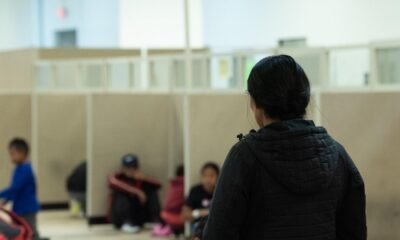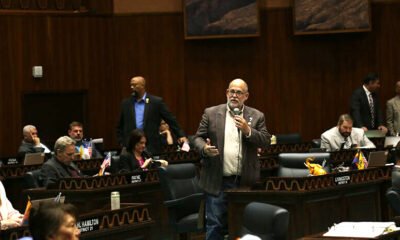2024 election
DNC Event Shines Spotlight on Democratic Women Governors Featuring ‘Veep’ Star Julia Louis-Dreyfus

CHICAGO — Actress and climate advocate Julia Louis-Dreyfus took to the stage during the Democratic National Convention on Wednesday, posing an intriguing question to eight Democratic women governors: after embodying a vice president and president on “Veep,” would she be prepared for a real political role? New York Governor Kathy Hochul responded quickly, humorously asserting, “You’re more qualified than Donald Trump,” prompting laughter throughout the gathering.
Moderating a panel of the Democratic governors, Louis-Dreyfus led a discussion that lasted about an hour. They addressed the unique challenges and advantages faced by women in politics while strategizing against potential election disruptions in the upcoming presidential race.
Addressing the electoral integrity issues, Arizona Governor Katie Hobbs shared her proactive measures to ensure the state’s electoral votes are safeguarded. Collaborating closely with the secretary of state and the attorney general, she emphasized the importance of being prepared for all possible scenarios in light of the chaotic 2020 election. “The challenges we faced in 2020 will look like kindergarten compared to what we are expecting now. But we are ready,” she stated.
The discussion also touched on a grand jury’s indictment of 18 individuals involved in a scheme designed to misrepresent electoral votes in favor of Donald Trump after he lost Arizona in the 2020 election. Similarly, Michigan Governor Gretchen Whitmer described ongoing efforts in her state to bolster election security, which includes legislation aimed at protecting election workers and facilitating early voting. “We know that there are going to be all sorts of efforts to influence the results,” she warned.
During the panel, Louis-Dreyfus probed Whitmer on how she manages her responsibilities amid various crises, such as the pandemic and threats against her life. Whitmer shared that maintaining a gratitude journal helps her stay grounded, listing even simple joys like her dog and favorite drinks as daily highlights.
Discussion then pivoted to the importance of supporting women in politics beyond national elections. Hobbs emphasized early backing, noting its role in advancing figures like Vice President Kamala Harris, who started as San Francisco’s district attorney in 2003. “Down-ballot races are critical,” she affirmed, with several governors echoing this sentiment based on their own political journeys.
Oregon Governor Tina Kotek highlighted her tenure as the state legislature’s longest-serving speaker and the first openly lesbian speaker. Her experience underscored the significance of representation in leadership roles, something Massachusetts Governor Maura Healey can relate to, having made history in her state a year prior.
Whitmer commented on the frequent underestimation of women in politics, viewing it as a source of strength. “There are many different ways we’re treated compared to male candidates, but being underestimated can be a huge advantage,” she noted. Kansas Governor Laura Kelly projected optimism about the gradual fading of such perceptions with future female leadership. “With President Harris, it will,” Whitmer added, signaling hope for change.
In a lighter moment, Louis-Dreyfus engaged the governors on the role of humor in politics. New Mexico Governor Michelle Lujan Grisham described comedy as a valuable tool during tense times. A question about Republican oddities elicited laughter, with Maine Governor Janet Mills sharing insights about Republicans in her state who are considering voting for Democrats due to a disconnect with the traditional party structure.
The panel turned its attention to reproductive rights in light of the Supreme Court’s decision to overturn Roe v. Wade. The discussion mirrored a broader Democratic strategy aimed at safeguarding abortion access at both state and federal levels. Four states, including California and Michigan, successfully passed measures to protect abortion rights. Notably, seven additional states have citizen-initiated measures on November ballots to further ensure these rights.
Hochul recounted her immediate response after the Supreme Court ruling, emphasizing her commitment to reproductive rights. “I called the state legislature back for an emergency session to protect medical professionals and patients traveling to New York for care. We let women from other states know this is a safe harbor for you to come here,” she asserted passionately. “I’m going to fight like hell to get back (abortion rights) for my granddaughter.”


















